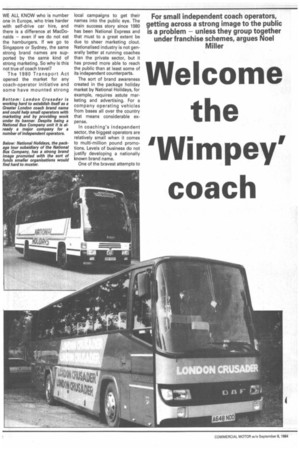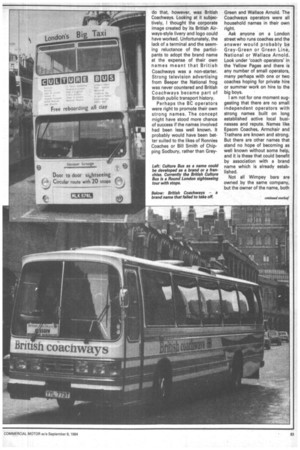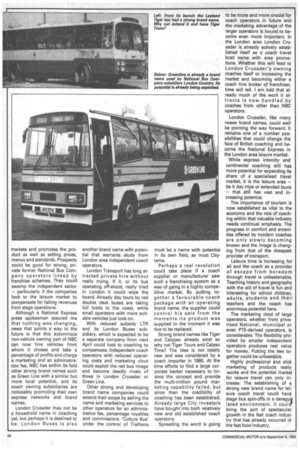Welcome the 'Wimpey' coach
Page 64

Page 65

Page 66

If you've noticed an error in this article please click here to report it so we can fix it.
WE ALL KNOW who is number one in Europe, who tries harder with self-drive car hire, and there is a difference at MacDonalds — even if we do not eat the hamburgers. If we go to Singapore or Sydney, the same strong brand names are supported by the same kind of strong marketing. So why is this not true of coach travel?
The 1980 Transport Act opened the market for any coach-operator initiative and some have mounted strong local campaigns to get their names into the public eye. The main success story since 1980 has been National Express and that must to a great extent be due to sheer marketing clout. Nationalised industry is not generally better at running coaches than the private sector, but it has proved more able to reach the public than at least some of its independent counterparts.
The sort of brand awareness created in the package holiday market by National Holidays, for example, requires astute marketing and advertising. For a company operating vehicles from bases all over the country that means considerable expense.
In coaching's independent sector, the biggest operators are relatively small when it comes to multi-million pound promotions. Levels of business do not justify developing a nationally known brand name.
One of the bravest attempts to do that, however, was British Coachways. Looking at it subiectively, I thought the corporate image created by its British Airways-style livery and logo could have worked. Unfortunately, the lack of a terminal and the seeming reluctance of the participants to adopt the brand name at the expense of their own names meant that British Coachways was a non-starter. Strong television advertising from Beeper the National frog was never countered and British Coachways became part of British public transport history.
Perhaps the BC operators were right to promote their own
strong names. The concept might have stood more chance of success if the names involved had been less well known. It probably would have been better suited to the likes of Ronnies Coaches or Bill Smith of Chipping Sodbury, rather than Grey
Green and Wallace Arnold. The Coachways operators were all household names in their own right.
Ask anyone on a London street who runs coaches and the answer would probably be Grey-Green or Green Line, National or Wallace Arnold. Look under 'coach operators' in the Yellow Pages and there is any number of small operators, many perhaps with one or two coaches hoping for private hire or summer work on hire to the big boys.
I am not for one moment suggesting that there are no small independent operators with strong names built on long established active local businesses and repute. Names like Epsom Coaches, Armchair and Trathens are known and strong. But there are other names that stand no hope of becoming as well known without some help, and it is these that could benefit by association with a brand name which is already established.
Not all Wimpey bars are owned by the same company, but the owner of the name, both markets and promotes the product as well as setting prices, menus and standards. Prospects could be good for strong, private former National Bus Company operators linked by franchise schemes. They could swamp the independent sector — particularly if the companies look to the leisure market to compensate for falling revenues from stage operations.
Although a National Express press spokesman assured me that nothing was changing, news that points a way to the future is that this autonmous non-vehicle owning part of NBC can now hire vehicles from whom it choses and take a percentage of profits and charge a marketing and an administration fee. NBC has within its fold other strong brand names such as Green Line with a similar but more local potential, and its coach owning subsidiaries are noticeably promoting their own express networks and brand names.
London Crusader may not be a household name in coaching yet, but perhaps it is destined to be. London Buses is also another brand name with potential that warrants study from London area independent coach operators.
London Transport has long attracted private hire without really trying. If it, or its bus operating off-shoot, really tried in London it could wipe the board. Already day tours by red double deck buses are taking full loads to the coast, while small operators with more suitable vehicles just look on.
With reduced subsidy LTR and its London Buses subsidiary, which is expected to be a separate company from next April could look to coaching to compensate. Independent coach operators with reduced operating costs and marketing clout could exploit the red bus image and become deadly rivals of those in London Crusader or Green Line.
Other strong and developing brand name companies could extend their scope by selling the name and marketing services to other operators for an administrative fee, percentage royalties and commissions. 'Culture Bus' under the control of Trathens must be a name with potential in its own field, as must Cityram a.
Perhaps a real revolution could take place if a coach supplier or manufacturer saw such a franchising system as a way of gaing in a highly competitive market. By putting together a favourable coach package with an operating brand name, the supplier could control his sale from the moments its product was supplied to the moment it was due to be replaced.
Strong brand names like Tiger and Calypso already exist so why not Tiger Tours and Calpso Time? The idea is not totally new and was considered by a coach importer in 1980. At the time efforts to find a large corporate backer necessary to finance the concept and provide the multi-million pound marketing capability failed, but since then the credibility of coaching has been established. Already large City investors have bought into both relatively new and old established coach operators.
Spreading the word is going to be more and more crucial for coach operators in future and the marketing advantage of the larger operators is bound to become even more important. In the London area London Crusader is already actively established itself as a coach travel brad name with area promotions. Whether this will lead to London Crusader's owning coaches itself or increasing the market and becoming either a coach hire broker of franchiser, time will tell. I am told that already much of the work it attracts is now handled by coaches from other than NBC operators.
London Crusader, like many newer brand names, could well be pointing the way forward. It remains one of a number possibilities that could change the face of British coaching and become the National Express in the London area leisure market.
While express intercity and continental coaching still has more potential for expanding its share of a specialised travel market, it is the leisure area — be it day trips or extended tours — that still has vast and increasing potential.
The importance of tourism is now established as vital to the economy and the role of coach ing within that valuable industry needs continual emphasis. The progress in comfort and ameni ties offered by modern coaches are only slowly becoming known and the image is changing from that of the cheapest provider of transport.
Leisure time is increasing for all and the coach as a provider of escape from boredom through travel is unbeatenable. Teaching history and geography with the aid of travel is fun and interesting for school children, adults, students and their teachers and the coach has enormous potential here.
The marketing clout of large operators, whether from priva tised National, municipal or even PTE-derived operators, is considerable. The flexibility pro vided by smaller independent operators produces real value for money. Putting the two together could be unbeatable.
Highly professional and slick marketing of products really works and the potential market for leisure travel can only increase. The establishing of a strong new brand name for leisure coach travel could have stage bus spin-offs in a deregui lated environment. It could' bring the sort of spectacular growth in the fast coach industry that has already occurred in the fast food industry.




























































































